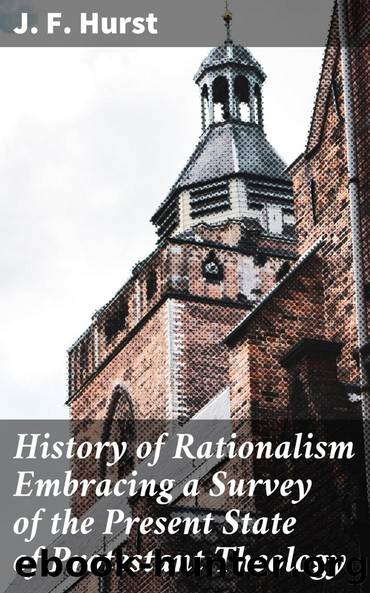History of Rationalism Embracing a Survey of the Present State of Protestant Theology by J. F. Hurst

Author:J. F. Hurst [Hurst, J. F.]
Language: eng
Format: epub
Tags: Nonfiction, History
ISBN: 4057664599742
Publisher: Good Press
Published: 2019-12-02T05:00:00+00:00
For a number of years the Pastoral Conferences, composed of small circles of devoted ministers and laymen, had been in existence, and kept their attention carefully directed to the necessities of the times. The increased danger made the members doubly watchful. In view of the exigency, some of the leaders arrived at the conclusion to call a church assembly of all the leading evangelical sects, to take such action as the peculiar condition of theology, religion, and politics might require. During the first six months of the revolutionary year of 1848, three of these pastoral conferences held their sessions, during which the propriety of convening a general assembly was discussed. The conference at Sandhof, on the 21st June, was the occasion of serious embarrassment. It was well nigh concluded that the whole enterprise would prove a failure, but Dr. Bethmann-Hollweg arose, and by a few stirring words infused hope and zeal into every member. "It is the Lord, my friends," he said, "who builds the church. Never forget this. Whether the assembly spoken of will accomplish what we desire and hope, no one can tell. Our resolution must be an act of faith. Like Peter, we shall have to walk on the sea; but we know also that the Lord does not suffer any one to perish who trusts in him. If we look merely upon ourselves and upon the scattered, distracted, and weak members of the church, we would have indeed to despair. But if we raise our eyes in faith to him who is the Lord, we will venture it."
The conference yielded to this earnest appeal, and a general assembly was called, to convene at Wittenberg, in the following autumn. On the 21st of September, the appointed day, five hundred of the leading evangelical theologians and laymen of Germany were present, to adopt whatever measures might be thought best to avert existing and impending evils. They met in the same old gothic temple on whose door, three centuries previously, Luther had nailed his ninety-five theses. The exercises opened with prayer, and the singing of Luther's hymn, "Eine feste Burg ist unser Gott," which has been thus translated by Carlyle:
"A safe stronghold our God is still,
A trusty shield and weapon;
He'll help us clear from all the ill
That hath us now o'ertaken.
The ancient Prince of Hell
Hath risen with purpose fell;
Strong mail of craft and power
He weareth in this hourâ
On earth is not his fellow.
Download
This site does not store any files on its server. We only index and link to content provided by other sites. Please contact the content providers to delete copyright contents if any and email us, we'll remove relevant links or contents immediately.
FOX'S BOOK OF MARTYRS by Adrian Ebens(301)
(eng) Mervyn Peake - Gormenghast 2.5 by Boy in Darkness(217)
The Second Coming of Saturn: The Great Conjunction, Americaâs Temple, and the Return of the Watchers by Derek P. Gilbert(204)
The origins of violence by John Docker(194)
Llewellyn's 2024 Sabbats Almanac by Llewellyn Publishing(179)
English Cathedral & Monastic Carpentry by Cecil A. Hewett(168)
The Second Coming of Gluttony: 1-489 by FudgeNouget(167)
The Lesser Key of Solomon by Samuel Liddell MacGregor Mathers(164)
Journey through the Text of "A Course in Miracles by Kenneth Wapnick Ph.D(164)
THE ORIGIN OF ALL RELIGIOUS WORSHIP by DUPUIS(163)
The Healing Power of Kindness âVolume 1: Releasing Judgment by Kenneth Wapnick(159)
668113337 by Unknown(158)
Tao of Wing Chun Do by (Volume 2 Chi Sao)(156)
Vasubandhu's "Three Natures by Ben Connelly(155)
The Knights Templar and their myth by Peter Partner Murdered magicians(153)
Being, While Knowing That You Are Not: Surrendering to the sadness and madness of life (Reality Explained Trilogy Book 2) by Marc Leavitt(150)
Lillian Too's Irresistible Feng Shui Magic by Lillian Too(142)
Llewellyn's 2023 Sabbats Almanac by Elizabeth Barrette(138)
Pain Is Inevitable, Misery Is Optional by Hyrum W. Smith & Gerreld L. Pulsipher(133)
